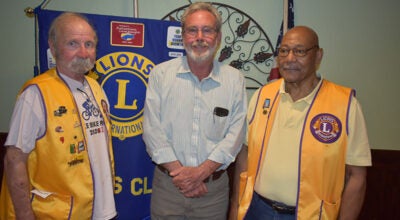West Point discusses decriminalization of Marijuana
Published 3:11 pm Sunday, November 29, 2020
|
Getting your Trinity Audio player ready...
|
The West Point City Council convened in a video conference for a work session on Tuesday. During that work session, the council discussed the possibility of decriminalizing marijuana in West Point.
The discussion was brought forward by Councilman Henry Hutchinson, who shared a personal experience.
Hutchinson said on his 17th birthday, a friend of his picked him up. Not far from his house was a police roadblock.
“The police officer asked to search the car and marijuana was found in the car,” Hutchinson said. “Of course, that friend did not claim that marijuana. I went to jail and with me being 17 and my friend being 16, I was charged for it.”
Hutchinson said since that experience, he’s had to get his record expunged to purchase a firearm or to stop it from showing up on routine background checks.
“I had to get my record expunged in order to prevent employers from seeing that pop-up, and this is what I am trying to prevent other young people from having to go through something like that,” Hutchinson said.
Hutchinson pointed out that many people that face these types of charges and those charges follow them, making it difficult to overcome.
“This is not about following a trend, or something that LaGrange is doing, but for the most part looking in-depth on how it can affect those in our community also,” Hutchinson said.
Councilwoman DeeDee Williams offered her appreciation to Hutchinson for sharing his story. “It’s a story that is far too common of young people like yourself, and I will guarantee you the outcome and the way it was handled with you, you can find many, many, many many, more of the same scenario, and it was not handled that way,” Williams said.
Councilwoman Sandra Thornton also thanked Hutchinson for telling his story.
“I just want to thank Henry for being honest with us. A lot of people won’t share things that have happened, and I just want him to know that you’re not the first,” Thornton said.
City Manager Ed Moon began the discussion citing Georgia state law regarding the possession of marijuana less than an ounce. Georgia law allows for municipalities to decriminalize less than one ounce of marijuana. Possession of marijuana is unlawful but could be met with a civil infraction and not a criminal infraction (i.e. felony or misdemeanor).
Moon then called upon city attorney Alex Dixon who laid the groundwork for what the council needed to determine.
“We need to decide ultimately whether it’s tonight or whatever point, is what direction the council wants to lead about whether or not we want to amend this ordinance and what parameters to put on that amendment including whether or not you want to flat out decriminalize it and make it not a crime reportable on criminal history, but make it a civil penalty,” Dixon said.
Making it a civil infraction leads to more decisions by the council such as, what the fine amount would be and whether there be a progressive fine for repeat offenders.
The council was provided several examples from other Georgia municipalities, including LaGrange, as a roadmap for their discussions.
Councilman Joe Downs voiced his support for making possession of less than an ounce a civil penalty and asked what the fine was in the LaGrange ordinance. In the LaGrange ordinance, the fine is not to exceed $100.
“I’m giving this opinion as a prosecutor. I’m the prosecutor for LaGrange Municipal Court and Hogansville Municipal Court,” Dixon said. “One of the problems I have as a prosecutor with these ordinances is the fines. When you make possession of marijuana less than an ounce a fine of $100, which they’ve done in LaGrange, and they’ve done in other municipalities, that’s less than running a stop sign. It’s less than a very minor speeding citation. It’s less than a minor in possession of alcohol.”
Williams said the consequences in Dixon’s scenarios are a bit different.
“You made the comparison between the amount that we charge for a speeder or someone running a stop sign,” Dixon said. “I see that a little differently, if you’re in a car driving and run a stop sign, in terms of the consequences of that versus someone that’s got marijuana in their pocket, and they’re not driving. I guess my age probably puts me in that mindset that no drugs are okay. But I have to think about when alcohol had serious penalties and our society moved in a different direction to think differently about that, and in some cases, it probably is no harm done and in other cases, it ends up being the cause of someone being killed.”
Councilwoman Gloria Marshall said more discussion needed to take place before an ordinance could be drawn up but offered a suggestion on how the fine should work.
“Start with a hundred dollar fine for the first offense and maybe in our discussion we can decide if we charge more for maybe the third or fourth offense,” Marshall said.
Councilman Gerald Ledbetter also agreed to Marshall’s suggestion and added his opinion on the decriminalization.
“For me is the fact that the record doesn’t follow the individual for the small, and many times, an insignificant event,” Ledbetter said. “It’s not so much the fine, it’s the fact that criminalization of an ounce or less sticks with people. It makes it difficult for them in the future to get jobs and to pay fines, and to pay probation. It’s almost like a trap that people get in and they can’t get out because the system is stacked against them at that point.”
The discussion concluded with Mayor Steve Trammel asking Moon if he had enough information to draft an ordinance to be reviewed at the Dec. 10 meeting. Moon confirmed he had what he needed and would present that at the next work session.
The council will meet again on Thursday, Dec 10 at 5:30 p.m.





